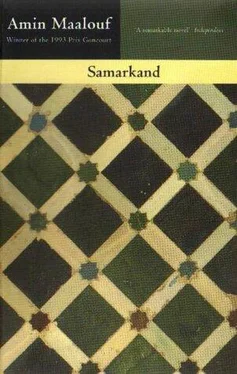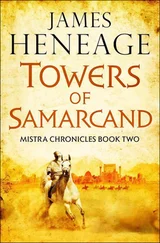While the crowd was attacking the remains of the Assassin, five officers gathered around the still warm body of Nizam. They were in tears and stretched out their right hands as they mouthed in unison: ‘Rest in peace, master. None of your enemies will live!’
But where would they begin? The list of outlaws was long, but Nazam’s orders were clear. The five men almost had no need to consult each other. They muttered a name and stretched out their hands anew. Then they kneeled down and together raised up the body which had been emaciated by illness but was now weighed down by death, and carried it in a cortege to his quarters. The women had already assembled to wail and the sight of the cadaver renewed their ululations, arousing the ire of one of the officers: ‘Do not cry while he is still unavenged!’ The women were afraid and broke off their crying to look at the man who was already making his way off. Then they started up their noisy lamentations again.
The Sultan arrived. He had been with Terken when the first cries reached him. A eunuch who had been sent out for the news came back trembling. ‘It’s Nizam al-Mulk, master! A killer jumped on him. He has given you the rest of his life!’ The Sultan and Sultana exchanged a glance and then Malikshah arose. He put on his long cloak of karakul , patted his face in front of his spouse’s mirror and then ran off to see the deceased, feigning surprise and a state of the gravest affliction.
The women stepped aside to allow him to approach the body of his ata . He leant over, uttered a prayer and some appropriate phrases before returning to Terken for some discrete celebrations.
How curiously Malikshah behaved. One would have thought that he would have profited from his tutor’s disappearance to take complete control over the affairs of his empire, but not so. He was so happy at finally being rid of the man who checked his passions, that he frolicked — and there can be no other word for it. Every meeting was cancelled as a matter of course, as was every reception for an ambassador and the Sultan’s days were given over to polo and hunting while his nights were spent in bouts of drinking.
Yet more serious was the fact that upon his arrival in Baghdad he had sent a message to the Caliph, saying: ‘I intend to make this city my winter capital. The Prince of Believers must decamp post haste and find another residence.’ The successor of the Prophet, whose ancestors had been living in Baghdad for three and a half centuries, requested a month’s grace in order to put his affairs in order.
Terken was worried by this frivolity which was little worthy of a thirty-seven-year-old sovereign who was master of half of the world, but her Malikshah was what he was so she let him fool around and took the opportunity this gave her to establish her own authority. It was to her that emirs and dignitaries had recourse and it was her trusted men who replaced Nizam’s acolytes. Between trips and drunken binges the Sultan gave his agreement.
On 18 November 1092 Malikshah was in the north of Baghdad hunting wild ass in a woody and swampy area. Only one of his previous twelve arrows had missed its target. His companions were singing his praises and none of them dreamed of matching his feats. The trip had made him hungry — a feeling he expressed in oaths. The slaves set to it. There were a dozen of them brought along to dismember, skewer and gut the wild beasts which were to be roasted in a clearing. The meatiest leg was for the sovereign who took hold of it and ripped it to pieces hungrily while treating himself liberally to some fermented liquor. From time to time he munched on fruit preserved in vinegar which was his favourite dish and huge vessels of which were carried everywhere Malikshah went by his cook so that he would never have to do without.
Suddenly he was beset with violent stomach cramps. Malikshah screamed in pain and his companions trembled. He threw down his goblet and spat out what he had in his mouth. He was bent double, he threw up everything he had eaten, became delirious and then fainted. Around him dozens of courtiers, soldiers and servants trembled as they watched him with disbelief. No one would ever know whose hand slipped the poison into his liquor, or was it in the vinegar, or the game? Nonetheless everyone made their calculations: thirty-five days had passed since Nizam’s death. He had said ‘less than forty’ and his avengers were on time.
Terken Khatun was in the royal camp, an hour away from the scene of the drama. The Sultan was carried in to her inanimate but still alive. She hurriedly sent away all onlookers, keeping by her only Jahan and two or three other trusted courtiers as well as the court doctor who was holding Malikshah’s hand.
‘Might the master recover?’ the Chinese woman inquired.
‘His pulse is weakening. God has blown on the candle and it is flickering before going out. Our only hope is prayer.’
‘If such is the will of the Almighty, then listen to what I am going to say.’
This was not the tone of a widow-to-be, but of the mistress of an empire.
‘No one outside this yurt must know that the Sultan is no longer with us. Merely say that he is recovering slowly, that he needs to rest and that no one may see him.’
What a fleeting and bloody epic was that of Terken Khatun. Even before Malikshah’s heart had ceased beating, she demanded her handful of faithful courtiers to swear loyalty to Sultan Mahmoud, whose age was four years and a few months. Then she sent a messenger to the Caliph to announce the death of her spouse and to ask him to confirm her son’s succession; in exchange the Prince of Believers would no longer have cause for concern in his capital and his name would be glorified in the sermons of mosques throughout the empire.
When the Sultan’s court set off again for Isfahan, Malikshah had been dead for some days but the Chinese woman continued to keep the news from the troops. The cadaver was laid out on a large chariot pulled by six horses and covered by a tent. However, the charade could not last indefinitely for a corpse which has not been embalmed can not linger amongst the living without its decomposition betraying its presence. Terken chose to be rid of it and thus Malikshah, ‘the revered Sultan, the great Shahinshah, the King of the Orient and the Occident, the Pillar of Islam and of the Muslims, the Pride of the World and of the Religion, the Father of Conquests, the Steadfast Support of the Caliph of God’, was hastily interred by night at the side of the road in a place which no one has ever been able to find. ‘Never,’ said the chroniclers, ‘has there been told of such a powerful sovereign dying without anyone to pray or weep over his corpse.’
News of the Sultan’s disappearance finally got out, but Terken had no trouble justifying her actions: her first concern had been to hide the news from the enemy since the army and the court were far from the capital. In fact the Chinese woman had won the time she needed to place her son on the throne and to take up the reins of power herself.
The chronicles of the time make no mistake. When speaking of the imperial troops, they henceforth say ‘the armies of Terken Khatun’. When speaking of Isfahan, they point out that it is Terken’s capital city. As for the name of the child-Sultan, it would be as good as forgotten, and he would only be remembered as the ‘son of the Chinese woman’.
The officers of the Nizamiya were nevertheless opposed to the Sultana. Terken Khatun was second on their list of outlaws, just after Malikshah, to whose eldest son, Barkiyaruk aged eleven, they gave their support. They surrounded him, advised him and led him off to battle. The first skirmishes left them with the advantage and the Sultana had to fall back on Isfahan which was soon under siege. Terken, however, was not a woman to admit defeat and to defend herself she was willing to use tricks which would long be famous.
Читать дальше












